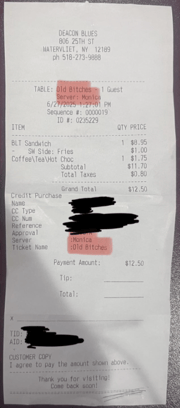What’s really in those $7 meals RFK Jr. supports? A closer look at Mom’s Meals
By
Veronica E.
- Replies 0
Robert F. Kennedy Jr., now serving as Health Secretary, has long spoken out against ultraprocessed foods and urged Americans to return to simpler, whole-food diets.
But after a recent tour of a food facility in Oklahoma, he publicly praised a meal delivery company—Mom’s Meals—that offers ready-to-eat dishes for $7 each, delivered directly to the homes of Medicaid and Medicare enrollees.
In a video posted to his official government account, Kennedy called the company’s offerings “one of the solutions for making our country healthy again.”
The meals are funded in part by taxpayer dollars and are designed to serve vulnerable Americans—including those recovering from illness, managing chronic conditions, or living with limited mobility.
But as praise for the company spread, critics raised an important question: Do the meals themselves align with Kennedy’s push for whole, minimally processed foods?

The company’s dishes are designed to be convenient and ready to heat.
Popular items include chicken bacon ranch pasta, French toast sticks with fruit, and ham patties.
The meals are delivered to Medicaid and Medicare participants who meet certain criteria, such as a recent hospital discharge or a chronic health diagnosis like diabetes or cancer.
While the service is intended to help those in need access food more easily, a closer look at the labels tells a more complicated story.
According to Marion Nestle, a renowned nutritionist and food policy expert at New York University, the ingredients in Mom’s Meals are more processed than the company lets on.
Nestle reviewed several of the menu items for the Associated Press and found them “loaded with ultraprocessed additives,” including chemicals that you wouldn’t use in a home kitchen.
“Every one of the meals I looked at is loaded with such additives,” Nestle said.
“What’s so sad is that they don’t have to be this way. Other companies are able to produce much better products, but of course they cost more.”
Nestle did acknowledge that Mom’s Meals avoids certain controversial additives, such as artificial petroleum-based dyes—an issue Kennedy has publicly campaigned against.
But she emphasized that many of the meals still include processed starches, stabilizers, and flavor additives that meet the definition of ultraprocessed.
Most foods Americans eat are processed in some way, whether it’s through freezing, grinding, or canning.
But ultraprocessed foods are a more industrial category—typically made in factories with added sugars, synthetic stabilizers, artificial flavors, and preservatives not found in a typical home pantry.
Teresa Roof, a spokeswoman for Mom’s Meals, defended the company in an emailed statement.
She said their products “do not include ingredients that are commonly found in ultraprocessed foods,” such as synthetic food dyes, high fructose corn syrup, or preservatives banned in Europe.
However, she did not directly address the company’s use of other additives that critics argue still place the meals firmly in the ultraprocessed category.
Andrew Nixon, a spokesperson for the Department of Health and Human Services, called Mom’s Meals a “healthy alternative” to what many people might find at the grocery store.
The company is one of several across the country offering “medically tailored” at-home meals through Medicaid waivers and Medicare Advantage plans.
Still, the government’s funding of these programs has drawn scrutiny.
A STAT News investigation last year found that while states spend millions of dollars on these services, some of the meals labeled as “healthy” or “dietitian approved” are packed with salt, sugar, and unhealthy fats—the very ingredients often blamed for worsening chronic conditions among older Americans.
It’s important to acknowledge that these meals serve a real need.
For seniors recovering from illness, living alone, or managing fatigue, cooking daily isn’t always possible.
In that context, programs like Mom’s Meals may offer valuable support by helping ensure consistent access to food for individuals who need it.
At the same time, experts like Marion Nestle note that it’s important to consider the nutritional quality of convenient meal options.
Even when meals are funded through Medicare or recommended by a provider, it’s worth reviewing the ingredients and nutrition information to make informed choices.
If you or a loved one rely on ready-made meals, here are a few ways to make more informed choices:
Even small improvements—like adding fresh fruit or a low-sodium side—can help round out a meal and reduce long-term risk.
Kennedy has long said that reclaiming America’s health is about more than just diet—it’s about freedom.
“This country has lost the most basic of all freedoms—the freedom that comes from being healthy,” he recently posted.
His call for better diets has resonated across political lines, forming a coalition of supporters who identify with his “MAHA” platform: Make America Healthy Again.
As this story illustrates, navigating health and nutrition can be complex.
Even endorsements made with good intentions may lead to important questions about the ingredients and quality of the foods we rely on.
Read next: Are the foods you're eating safe? Why Americans are fighting to ban these common food ingredient

Have you or a loved one tried meal services like Mom’s Meals? Were they helpful, or did the ingredients give you pause? What quick meal swaps have worked best for your health goals? Share your thoughts with us—we’d love to learn from each other and keep the conversation going.
But after a recent tour of a food facility in Oklahoma, he publicly praised a meal delivery company—Mom’s Meals—that offers ready-to-eat dishes for $7 each, delivered directly to the homes of Medicaid and Medicare enrollees.
In a video posted to his official government account, Kennedy called the company’s offerings “one of the solutions for making our country healthy again.”
The meals are funded in part by taxpayer dollars and are designed to serve vulnerable Americans—including those recovering from illness, managing chronic conditions, or living with limited mobility.
But as praise for the company spread, critics raised an important question: Do the meals themselves align with Kennedy’s push for whole, minimally processed foods?

Mom’s Meals delivers ready-to-eat dishes to homes across the country—now drawing both praise and scrutiny over what’s really inside. Image Source: YouTube / KCCI.
What’s on the menu at Mom’s Meals?
The company’s dishes are designed to be convenient and ready to heat.
Popular items include chicken bacon ranch pasta, French toast sticks with fruit, and ham patties.
The meals are delivered to Medicaid and Medicare participants who meet certain criteria, such as a recent hospital discharge or a chronic health diagnosis like diabetes or cancer.
While the service is intended to help those in need access food more easily, a closer look at the labels tells a more complicated story.
Also read: What did RFK Jr. do to the CDC’s vaccine committee? Here’s how it affects you.
Are the meals actually ultraprocessed?
According to Marion Nestle, a renowned nutritionist and food policy expert at New York University, the ingredients in Mom’s Meals are more processed than the company lets on.
Nestle reviewed several of the menu items for the Associated Press and found them “loaded with ultraprocessed additives,” including chemicals that you wouldn’t use in a home kitchen.
“Every one of the meals I looked at is loaded with such additives,” Nestle said.
“What’s so sad is that they don’t have to be this way. Other companies are able to produce much better products, but of course they cost more.”
Nestle did acknowledge that Mom’s Meals avoids certain controversial additives, such as artificial petroleum-based dyes—an issue Kennedy has publicly campaigned against.
But she emphasized that many of the meals still include processed starches, stabilizers, and flavor additives that meet the definition of ultraprocessed.
Also read: Are these oils really poisoning you? Dietitians weigh in on RFK Jr.’s shocking claim
What does “ultraprocessed” really mean?
Most foods Americans eat are processed in some way, whether it’s through freezing, grinding, or canning.
But ultraprocessed foods are a more industrial category—typically made in factories with added sugars, synthetic stabilizers, artificial flavors, and preservatives not found in a typical home pantry.
Teresa Roof, a spokeswoman for Mom’s Meals, defended the company in an emailed statement.
She said their products “do not include ingredients that are commonly found in ultraprocessed foods,” such as synthetic food dyes, high fructose corn syrup, or preservatives banned in Europe.
However, she did not directly address the company’s use of other additives that critics argue still place the meals firmly in the ultraprocessed category.
Also read: Are you eating this popular food? Doctors say it could be linked to Parkinson’s disease
The government's position—and what critics say
Andrew Nixon, a spokesperson for the Department of Health and Human Services, called Mom’s Meals a “healthy alternative” to what many people might find at the grocery store.
The company is one of several across the country offering “medically tailored” at-home meals through Medicaid waivers and Medicare Advantage plans.
Still, the government’s funding of these programs has drawn scrutiny.
A STAT News investigation last year found that while states spend millions of dollars on these services, some of the meals labeled as “healthy” or “dietitian approved” are packed with salt, sugar, and unhealthy fats—the very ingredients often blamed for worsening chronic conditions among older Americans.
Also read: Popular foods could look very different soon—RFK Jr’s FDA cracks down on this ingredient
Balancing convenience and health as we age
It’s important to acknowledge that these meals serve a real need.
For seniors recovering from illness, living alone, or managing fatigue, cooking daily isn’t always possible.
In that context, programs like Mom’s Meals may offer valuable support by helping ensure consistent access to food for individuals who need it.
At the same time, experts like Marion Nestle note that it’s important to consider the nutritional quality of convenient meal options.
Even when meals are funded through Medicare or recommended by a provider, it’s worth reviewing the ingredients and nutrition information to make informed choices.
Also read: A big change is coming to your order—here’s what’s behind the switch
Smart tips for spotting ultraprocessed meals
If you or a loved one rely on ready-made meals, here are a few ways to make more informed choices:
- Read the full ingredient list — The longer and more unfamiliar it is, the more processed it likely is.
- Watch for synthetic additives — Look for terms like “maltodextrin,” “modified food starch,” or “hydrolyzed protein.”
- Review nutrition facts — Meals with more than 600 mg of sodium, added sugars, or high saturated fat may be worth reconsidering.
- Look for whole ingredients — Chicken, brown rice, and vegetables should appear near the top of the list.
Even small improvements—like adding fresh fruit or a low-sodium side—can help round out a meal and reduce long-term risk.
Also read: Could your utility bills skyrocket soon? What new EPA rules on drinking water mean for you
RFK Jr.’s message: freedom through health
Kennedy has long said that reclaiming America’s health is about more than just diet—it’s about freedom.
“This country has lost the most basic of all freedoms—the freedom that comes from being healthy,” he recently posted.
His call for better diets has resonated across political lines, forming a coalition of supporters who identify with his “MAHA” platform: Make America Healthy Again.
As this story illustrates, navigating health and nutrition can be complex.
Even endorsements made with good intentions may lead to important questions about the ingredients and quality of the foods we rely on.
Read next: Are the foods you're eating safe? Why Americans are fighting to ban these common food ingredient
Key Takeaways
- RFK Jr., now serving as Health Secretary, recently praised Mom’s Meals, a $7-per-meal delivery service for Medicare and Medicaid recipients.
- Nutrition expert Marion Nestle reviewed the meals and found them to be highly processed, containing additives not commonly used in home kitchens.
- While the company avoids certain controversial ingredients, experts still classify the meals as ultraprocessed, raising concerns for older adults.
- Despite government support and convenience, critics urge caution and recommend reading labels, checking sodium and sugar content, and adding whole foods when possible.
Have you or a loved one tried meal services like Mom’s Meals? Were they helpful, or did the ingredients give you pause? What quick meal swaps have worked best for your health goals? Share your thoughts with us—we’d love to learn from each other and keep the conversation going.






